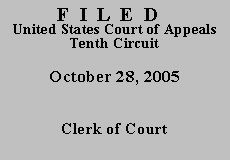

| UNITED STATES OF AMERICA,
Plaintiff-Appellant, |
|
| v. | |
| ANGEL H. SERRANO,
Defendant-Appellant. |
|
Mr. Serrano pleaded guilty to possession with intent to distribute more than five kilograms of cocaine, in violation of 21 U.S.C. § 841(a)(1). The presentence report attributed approximately 21.9 kilograms of cocaine to Mr. Serrano, resulting in a base offense level of 34. Applying USSG § 2D1.1(b)(1), the report also recommended a two-level increase in the offense level for possession of a firearm. Finally, the report recommended a three-level reduction for acceptance of responsibility under USSG § 3E1.1, resulting in a final offense level of 33. The district court adopted the presentence report's recommendations and sentenced Mr. Serrano to 135 months' imprisonment. On direct appeal, we affirmed Mr. Serrano's conviction and sentence. See United States v. Serrano, No. 02-3442, 2003 WL 22245951 (10th Cir. Oct. 1, 2003).
The relevant facts are set forth in our prior order and judgment and in the district court's order denying the § 2255 petition. In January 2002, after receiving information from a confidential informant that Mr. Serrano intended to sell cocaine, police officers set up surveillance of Mr. Serrano's residence. An Immigration and Naturalization Service Special Agent observed Mr. Serrano exiting his residence and placing a duffle bag into his vehicle.
A Kansas City, Kansas police officer subsequently stopped Mr. Serrano for making an improper lane change. During the stop, Mr. Serrano admitted to possessing eight kilograms of cocaine, and the police officer arrested him.
During a post-arrest interview, Mr. Serrano admitted that he was on his way to sell the cocaine. He also informed officers that they could recover a handgun and $9,000 in currency from the master bedroom of his residence. The $9,000 constituted proceeds from cocaine sales.
Mr. Serrano then consented to a search of his home. There, officers discovered, $9,000 in currency (in a dresser drawer in the master bedroom), a .38 caliber Colt firearm and ammunition (in the closet of the master bedroom), twenty-five grams of cocaine (in a doorjamb in the master bedroom), and eighty-five grams of cocaine (in the pocket of a leather jacket found in another area of the residence).
Following our affirmance of his conviction and sentence, Mr. Serrano filed a 28 U.S.C. § 2255 motion alleging that he had received ineffective assistance of counsel in violation of the Sixth Amendment. Mr. Serrano challenged his counsel's failure to contest on direct appeal the two-level increase in the offense level under USSG § 2D1.1(b)(1) for possessing a firearm. The district court rejected Mr. Serrano's argument, concluding that the government had established that Mr. Serrano had kept a firearm near the general location where he had stored eight kilograms of cocaine and $9,000 in drug proceeds.
In order to obtain a COA, Mr. Serrano must make "a substantial showing of the denial of a constitutional right." 28 U.S.C. § 2253(c)(2). He may make this showing by demonstrating that "'reasonable jurists would find the district court's assessment of the constitutional claims debatable or wrong.'" Miller-El v. Cockrell, 537 U.S. 322, 338 (2003) (quoting Slack v. McDaniel, 529 U.S. 473, 484 (2000)). "[A] claim can be debatable even though every jurist of reason might agree, after the COA has been granted and the case has received full consideration, that [the] petitioner will not prevail." Id.
In challenging the two-level increase in the offense level under USSG § 2D1.1(b)(1), Mr. Serrano repeats the arguments that he advanced to the district court. He argues that there was no evidence to suggest a connection between the firearm and any drug offense, and that, as a result, his appellate counsel was constitutionally ineffective in failing to challenge the application of § 2D1.1(b)(1) on direct appeal. He also argues that in light of United States v. Booker, 125 S. Ct. 738 (2005), the district court violated his Sixth Amendment rights by relying on facts not found by the jury in determining his sentence.
For substantially the same reasons set forth in the district court's well-reasoned order, we are not convinced by Mr. Serrano's § 2D1.1(b)(1) argument. At sentencing the government presented evidence that the firearm discovered in Mr. Serrano's house was located near the area where he had stored cocaine and proceeds from the sales of cocaine. Mr. Serrano failed to establish that it was clearly improbable that the firearm was connected to offense of conviction. See United States v. Humphrey, 208 F.3d 1190, 1210 (10th Cir. 2000) (stating that "[t]he initial burden [under § 2D1.1(b)(1)] is on the government to prove possession of the weapon by a preponderance of the evidence, which may be satisfied by showing mere proximity to the offense" and that "[a]fter the government has met this burden, a defendant can still avoid the enhancement if he can prove that it is clearly improbable that the weapon was connected to the offense") (internal quotation marks omitted). As a result, Mr. Serrano's appellate counsel was not ineffective in failing to challenge the § 2D1.1(b)(1) enhancement.
As to Mr. Serrano's Booker claim, we note that "Booker does not apply retroactively on collateral review, and [a petitioner's] [Booker] claim may not be brought in [an] initial habeas review under 28 U.S.C. § 2255." United States v. Bellamy, 411 F.3d 1182, 1188 (10th Cir. 2005).
Accordingly, for substantially the same reasons set forth in the district
court's order, we DENY Mr. Serrano's application for a COA and DISMISS this appeal.
Entered for the Court,
Robert H. Henry
United States Circuit Judge